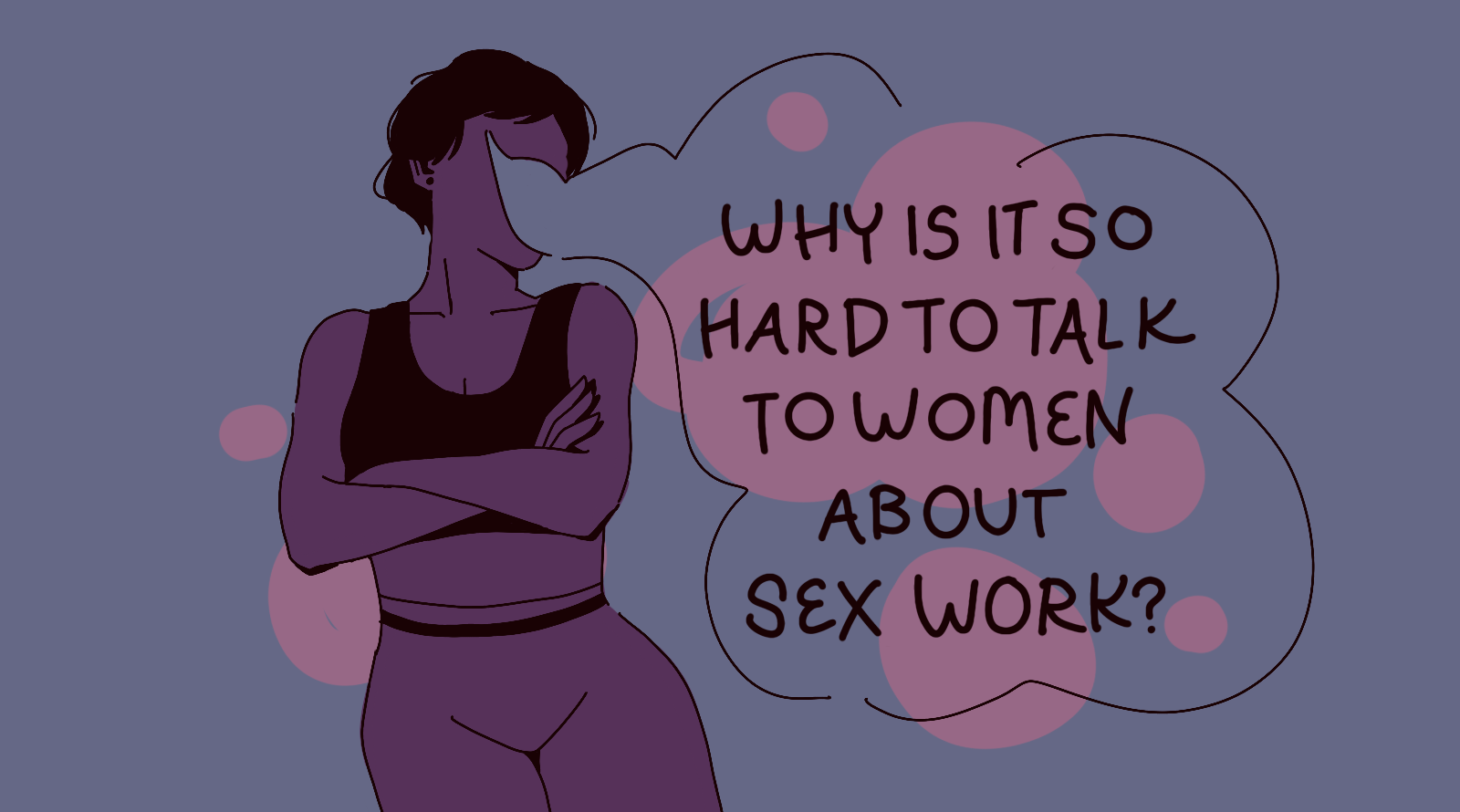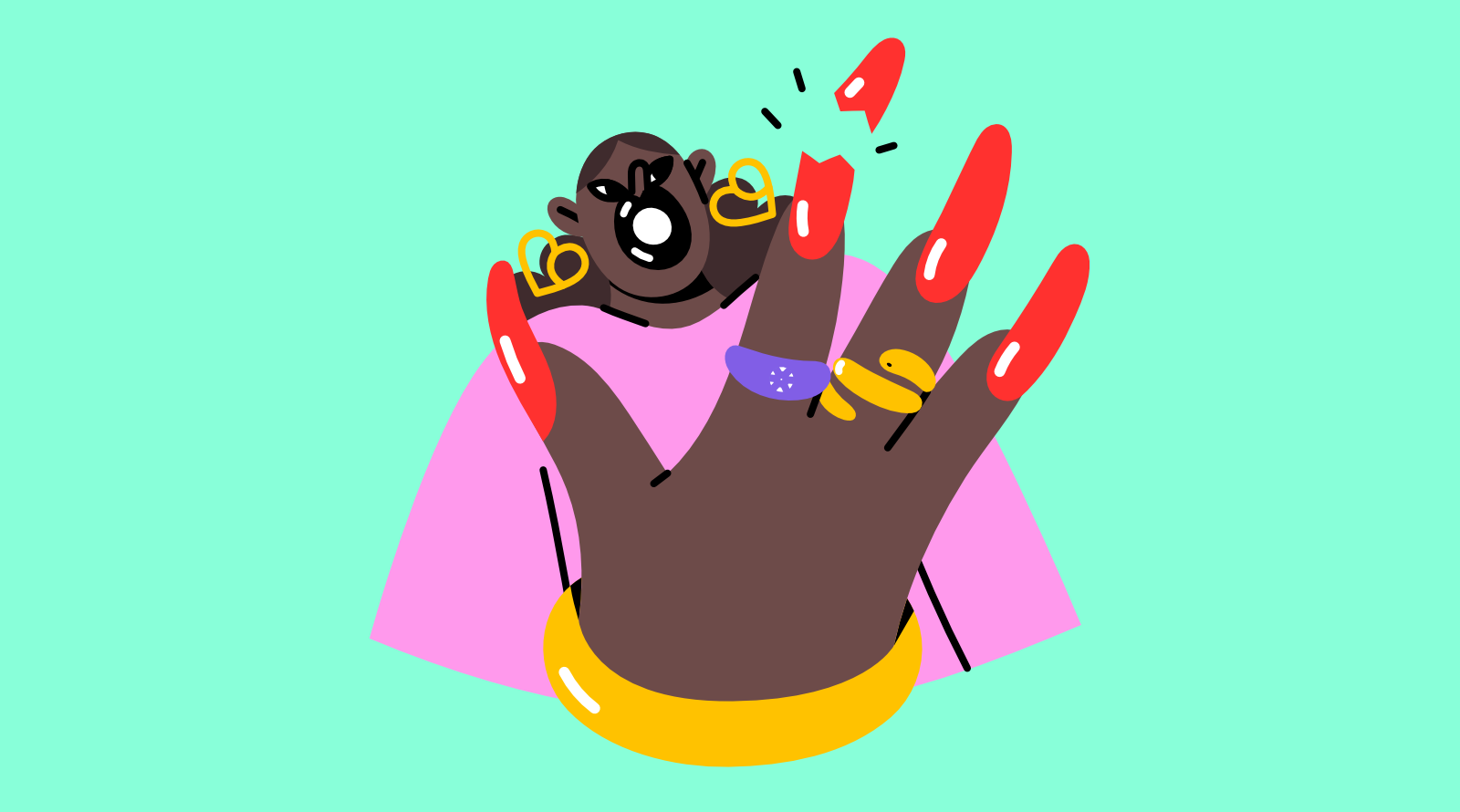Sometimes, we feel most alone when we’re in a crowd.
I was reminded of this recently when I joined some friends at a feminist speaking event in Brunswick, Melbourne. It was a ‘cross-generational storytelling night’, bringing together women and AFAB nonbinary folk of all ages. We watched as women in their 20s, 30s, 40, 50s, 60s, and 70s took to the stage in turn, each sharing a story from her life and speaking on a topic that was meaningful to her. We listened, cheered, and toasted each speaker’s life and experience.
It was great. I love getting a peek into the colourful lives of others! But, despite the camaraderie, I couldn’t help reflecting how different the atmosphere might be if I ascended those steps to utter the words, “I’m a sex worker.”
These kinds of gatherings can be so supportive. For many women, it’s their first experience of being accepted and understood. But I’m never sure if I’m going to receive the same welcome. As someone who was raised female, I supposedly have a lot in common with other women. But discussing my work hasn’t always been well received. It starts with schoolyard ‘mean girl’ behaviour…then, at the other end of the pipeline, there are those righteously angry radfems, who say they care about gender equality but just can’t get over the line when it comes to accepting that sex work is legitimate. I was called a ‘whore’ before I’d even lost my virginity. I’ve been judged by women friends because they think my job is gross, and I’ve dodged some seriously nasty sex worker exclusionary radical feminist (SWERF) put-downs on the internet.
Sex work stigma, or whorephobia, is alive and well in women’s spaces! It means I’m often hesitant to raise the subject, even when the people around me seem perfectly friendly. When it’s easier for me to come out about being an escort to a random bloke at the pub than to my woman peers, what’s gone wrong?
Here’s a bit of speculation as to why I’ve copped so much flak from some women about my work. I’m not a psychologist, so please don’t take this as a clinical assessment! It’s just my hunch, after years of being around women (and loving them, too), that our cultural gender baggage plays a huge part in whorephobia. Here are four reasons I suspect some women have a problem with sex work.
Internalised sex-shame
Many issues around judging the sexual behavior of others comes from sex-negativity, the pervasive (but incorrect) cultural idea that sex is gross, dangerous, and morally wrong. It’s the idea that our bodies and sexual urges are something to be ashamed of.
Sex-negativity is taught to us from a very young age, and takes many forms. It could look like your parents telling you that masturbation will make you sick. It might take the form of a righteous sermon about the dangers of sex before marriage or critical comments from your peers if they think you’re dating around too much.
Sex-negativity affects people of all genders, but in many cultures it’s particularly damaging to female sexuality. If you’ve ever heard the words ‘Nice girls don’t do that!’ or ‘You should be more ladylike!’ then you know exactly what I’m talking about. Often, as we grow older, this societal judgment becomes hard-baked into our sense of self. Internalized sex-negativity turns us into our own biggest critics. We police our own behavior and shame ourselves if we think we’ve strayed from what’s considered ‘normal’ and ‘appropriate’.
For those in the grip of internalized sex-shame, it can feel very confronting to meet someone who doesn’t feel uncomfortable in the same way. When imagining a steamy sex work scenario, their first instinct is to mentally place themselves in that situation…and they’re horrified. “Oh, I could never do that!” they say. What they really mean is, “I’m very uncomfortable with this.”
When I think about sex-negativity and the way we often project it onto others, I’m reminded of the time I interviewed sex work advocate Lucie Bee on fighting back against whorephobia. They have a comeback for this kind of situation: “Just because you couldn't do it doesn't mean that other people can't do it. Your awkward feelings about sex shouldn’t be the basis on which we judge other people’s choices.”
It’s important to also note that even if sex isn’t something you enjoy, it’s still possible to be sex-positive politically. You can be asexual, for example, which is just as healthy and normal as being sexually adventurous, but still support the fact that sex is acceptable for others.
Projected sexual trauma
We all know the statistics around gender-based violence. The vast majority of us have experienced it at some point in our lives. The narrative of many SWERFs is that sex workers end up in the job as a result of these experiences. They’ve never really substantiated this, but it’s a popular accusation that feeds into the standard ‘sex work is bad’ story.
What I have long suspected, though, is that perhaps the reverse is true. I don’t think sexual assault and abuse push women (or people of any gender), into sex work, but I do wonder if perhaps the women who are most offended by sex work are people who are still processing their own trauma? Is it possible that they struggle to accept that I actively consent at work, when their experiences have been so disempowering?
Like someone of any profession, I’ve also experienced sexual harassment and assault. Although I’ve been privileged enough to have the support of family, friends and therapists as I’ve moved through and past those incidents, it wasn’t a walk in the park. I can understand how it might feel like a betrayal to see someone opt in to sex work, if you’re still on that journey of coming to terms with your grief and trauma.
But the one thing I can say, with the benefit of hindsight, is that projecting trauma onto others is never going to lessen your suffering. It won’t speed up that painful process. It won’t build community. And it might make others - including sex workers, many of whom are women too - feel less safe.
Female rivalry: the lie of competition
From a young age we’re taught to compete with other women for male attention. This often leads to intense ‘female rivalry’ - women using their power to keep other women down, mistreat each other, or compete unnecessarily.
And in a world where women are shamed for being ‘promiscuous’ and encouraged to ‘tame’ men into committed relationships, a sex workers’ open sexuality is often seen as some kind of ‘unfair advantage’. It’s just another form of slut-shaming; one that triggers jealousy and insecurity rather than straight-out sex-negativity.
Female rivalry is the sleeper enemy of feminism. We should be holding each other up, not tearing each other down. To combat this one, we need to do something intersectional feminists have been urging for years: realize that we’re all in this together. Competing with each other sets us up to fail…and takes our attention away from the places our efforts could be more useful, such as demanding gender equality across the board, for all women.
Perceived threat to monogamy
Let’s not neglect another cornerstone of Western culture: the nuclear family.
When it comes to traditional family values, strict gender roles dictate that it’s the woman’s job to keep a man ‘trapped’ in family and monogamy. There’s this idea that men don’t have self-control and must be tied down by marriage, forced to be productive partners and fathers. This is a rather dim view of men, obviously, and also places a lot of the responsibility for their sexual behavior on their spouses and other women around them.
Hence the problem with sex work. By being sexually accessible for a quantifiable dollar amount, sex workers represent a threat to the monogamy and fidelity that’s seen as essential for the existence of the family. Under this ideology, there’s little or no responsibility ascribed to the ‘husband’ It’s all the fault of us ‘nasty hookers’ for tempting him away with the promise of easy, available sex. We seem to represent a threat to not just their marriages, but also to their safety and stability. Who will provide for the kids, if the husband is off with sex workers?
Let’s ignore for a moment that a family can be any kind of combination of people, of any gender identity, made up of any kind of relationship structure. And let’s ignore that men aren’t always the only working person in a household or the only person who might romantically or sexually roam outside the relationship.
Instead, let’s focus on the fact that if someone you love betrays you with someone else (whether it’s a sex worker or a co-worker), instead of focusing your rage on sex workers in general, maybe we should get into the habit of focusing our anger on the person with whom you have a social contract: your partner.
When people hear ‘sex worker’ they often think ‘mistress’, ‘home-wrecker’ or some other form of monogamy-ruining euphemism. But at the end of the day, I don’t sleep with husbands. I sleep with people. It’s not my responsibility to check for a marriage certificate before a booking. If sex workers didn’t exist, cheating still would. Getting rid of us doesn’t solve anything.
Conclusion
I’m not trying to make light of these difficult experiences. As I’ve noted already, I’ve also suffered through many of the life events and pressures that I suspect lie behind this gender-specific kind of anti-sex-work sentiment.
But we know the shit show that is ‘being raised femme’…and perhaps piling whorephobia on top of everything we’re dealing with isn’t beneficial for anyone. None of us benefits from hating sex workers. None of us gets ahead.
If we begin to understand where sex work stigma comes from - and perhaps know ourselves a little better - it might be easier to find common ground. And once we do that, we can focus on the fact that everyone - regardless of gender - should have the final say about what we do with our own bodies, both in and out of the bedroom.





